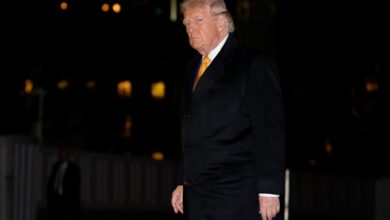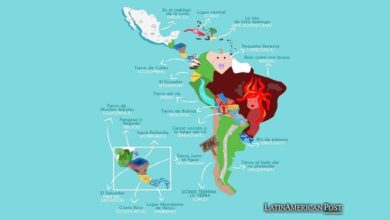European Union: Great Challenges Lie Ahead For the Group
The Group Of 27 Countries Faces a Breaking Point in Which They Will Define the Future Or the Failure Of the Institution.

We are in times of change that will define whether the group of European countries will strengthen or decline. Photo: Adobe Stock
LatiAmerican Post | Santiago Gómez Hernández
Listen to this article
Leer en español: Unión Europea: se avecinan grandes desafíos para el futuro del grupo
The third-largest economy in the world (behind only the United States and China), the European Union, is going through crucial moments. Times of change will define whether the group of European countries will strengthen or decline.
Aftermath of Brexit
Perhaps the strongest blow the group has received was the departure of the UK. One of the main members decided to leave the group amid tense negotiations that left the EU in a weak position. The United Kingdom was not only the second most populated country in Europe, but also the second-largest economy of the group, only behind Germany and the second military power of the group, only behind France.
The harshest aftermath of the British departure is not the loss of their economy or their stake and strength as a whole. At the end of the day, the English had always maintained differences with the group and were not part of the Schengen zone or the Euro zone, and the new commercial relationship between the EU and the UK will be similar. The hardest blow was showing the European Union its fragility and that any country in the future will be able to leave the group and survive.
The Devastation of Covid-19
The Covid-19 pandemic will not only leave strong economic consequences. The crisis caused by the virus showed that the European Union is rich, but not powerful. Despite money and influence, they were not able to pioneer vaccination, even their former partner (UK) demonstrated better results separately. This increases the vision of a European bureaucracy that prevents efficiency. Although vaccination programs in Europe currently outnumber other countries, their delay in delivering vaccines and the parallel success stories of Israel, the United Kingdom, Serbia, and the United States, among others, left Europeans behind.
The Aftermath of Trump
Although the Trump presidency is over (for now) in the United States, his legacy remains. Given the bad relations that existed between the US and the European Union, Brussels has decided not to continue depending on US power and diplomacy. A big change that demonstrates this is the position of both Angela Merkel (Germany) and Emmanuel Macron (France) of having a direct line with Russia. However, other members of the group, such as their counterparts from the Netherlands, Romania and Estonia, announced that they are unwilling to sit down with Russian President Vladimir Putin.
No More Merkel
Perhaps the biggest challenge the European Union will face is the departure of German Chancellor Angela Merkel. She has been the leader of Germany since 2005, which has the most powerful economy and the most populous country in the European group. In addition, she has also managed to be the visible head of the group and its innate leader. She has been able to sustain the group despite the Euro crisis, the Greek economic crisis, the migration crisis, Eurosceptic politicians, and many other challenges. She always had the backing of the German electorate.
Also read: 5 keys to undertand the ballistic treaty between the US and Russia
Merkel has already announced that she will not run in the national elections again, so her position as Chancellor and indirectly of the European head will be vacant. Her two possible replacements are France or the new German chancellor.
???????? Laschet dijo que una de las prioridades políticas de ser elegido como canciller será preservar la unidad europea y conducir a la Unión Europea a través de la crisis del coronavirus➡️ https://t.co/zDjGvJwF05 pic.twitter.com/7hKYD2QfaD
— FRANCE 24 Español (@France24_es) April 20, 2021
Today Emmanuel Macron has been Merkel's main ally and being the leader of the second power in Europe, it is expected that his protagonism will increase, even more, while there is a change of government in Germany. Precisely in that other sector, in the face of the Teutonic electoral panorama, Armin Laschet is seen as the future head of government. He will be the candidate of the Christian Democratic Union party (the same as Merkel) and he presents himself as a continuation of Merkel.
Expansion to the Balkans
In fact, Merkle recently announced a virtual summit with various leaders of Balkan nations on the importance of the countries of this area joining the EU. The European leader explained that inclusion is not only convenient for these South-Eastern European countries, she also stressed that the EU "is interested in advancing the process, reconciliation and cooperation between countries" and having a united Europe. However, for the German Chancellor, much remains to be done to make this happen. Countries such as Albania, Bosnia-Herzegovina, Kosovo, North Macedonia, Montenegro and Serbia have been in the process of joining the European group for several years.
La Unión Europea en la reunión del llamado "proceso de Berlín" coquetea con candidatos a miembros oficiales y potenciales de los países de los Balcanes. Jugada para alejarlos del mercado euroasiático de Rusia y China? Análisis de ayer en @N22Digital @Canal22 pic.twitter.com/seDmWcyKf7
— Iliana R.Santibáñez (@ilrodrig) July 6, 2021
Far-right Movements
Another great challenge the group faces are the countries that are already members. For example, the far-right governments of Hungary and Poland represent very different social policies from those that the current powers have wanted to promote. As an example, the fight for LGBTI rights in Europe or immigration policies find their strongest opponents in the governments of Viktor Orban and Andrzej Duda. These politicians have also represented a roadblock for monetary and lending policies for Merkel. Many times it is questioned whether the permanence of countries with such different governments strengthens or weakens the Union and that is why the inclusion of new partners will also go through a partnership analysis.





